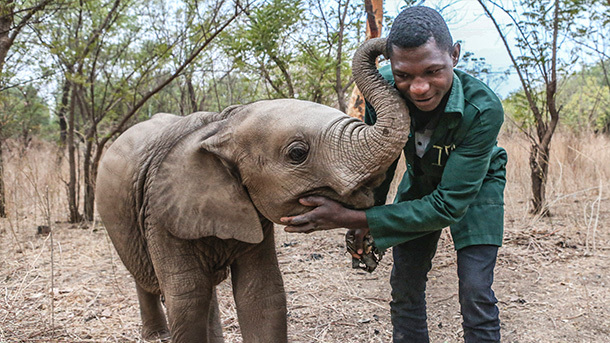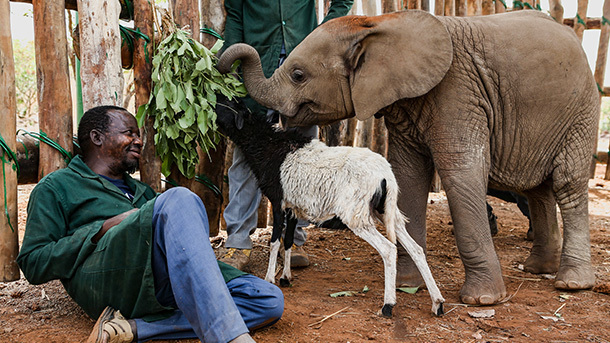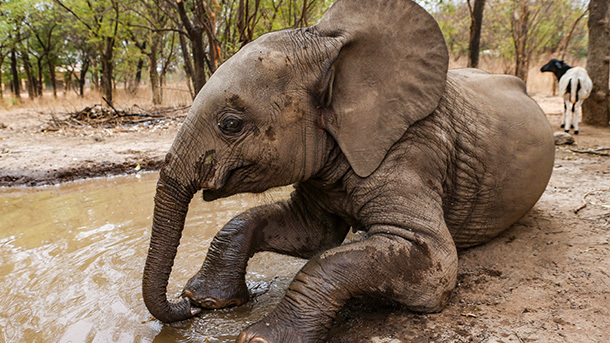Elephant Rescue and Rehabilitation Project - Burkina Faso
Saving one elephant calf can make a big differenceNania on the road back to the wild
Nania on the road back to the wild

The air was cold and the sky still dark when I arrived at the Deux-Balé management unit in Boromo. It was 4:45 AM, and only the braying of donkeys ambling along the streets and a few barking dogs could be heard. Soon, though, the muezzin’s call to prayer would resonate throughout the town. The first roars of car and motorcycle engines would mingle with the laughter of children on their way to school and the songs sung by soldiers on their morning run. But by that time, Nania will have left town.
From her makeshift enclosure, Nania has already felt my presence. Raising her trunk high, she sniffs and then curls her trunk into her mouth to analyse each molecule of the collected air with her Jacobson's organ. When it comes to sense of smell, elephants are superior to rats, as found in a 2014 study by researchers from the University of Tokyo. Nania has the most highly developed sense of smell in the entire animal kingdom. It is five times as powerful as that of humans, and twice as sensitive as that of dogs. As for many animals, the elephant’s world is first and foremost a world of scents.
As the truck that was to carry Nania to her new life maneuvered to position its platform level with the “stairs” built out of bags filled with rocks, Nania and I greeted each other in our usual way. Since elephants are extremely tactile, especially with their young, I caressed her trunk covered with fine sensory hairs and explained that we were bringing her back to her native habitat, close to her kin so that one day she would be ready to leave us and live with them as a wild elephant should. I told her about the rehabilitation enclosure (0.25 hectare, about 0.5 acre) that IFAW had built for her and about the nearby water source where her caretakers would bring her several times a day. I also announced that a special authorization had been obtained so that Whisty (a sheep that had become her friend) could stay in the park with her. Nania replied by planting the end of her trunk on my nose, like a suction pad.

It was 5:50 AM. The truck was ready for Nania and Whisty to board. Mattresses had been installed to protect the animals, and the team that would ride with them, from any injuries. Branches of tender leaves, a favorite treat enjoyed by our unlikely duo, had been hung up as requested. Several jerricans of water were lodged inside car tires arranged to form an enclosure and provide seating for the team. We had made do with the means available, using our creativity to ensure the wellbeing and safety, not only of Nania and Whisty, but of every one of us. At about 18 months of age, Nania weighed between 500 and 600 kilograms (1,000 to 1,200 pounds). We were no match for her. I approved the relatively cozy setup and made sure that our small team was ready for the next step.
6 AM: time for Nania’s second bottle. Every three hours, she would drink 2 liters of a complex formula adapted to her needs. Idrissa, Souleymane, Salif and Abdoulaye, the caretakers who had become surrogate mothers for the elephant calf, were betting everything on this bottle. I was not so confident. Giving Nania permission to leave her enclosure, Abdoulaye held the bottle before her, drawing her toward the bags of rocks that he had trained her to climb. This had always been easy. Listening to Salif and Idrissa as they encouraged her and keeping her gaze trained on the bottle, Nania put one foot on the first bag, a second on the next, and then stood still. She was not in the mood today. She sensed that the truck, which we introduced her to two days ago, was a trap. So it was Whisty’s turn to act as bait… with no more success. Nania did not want to cooperate. The small, perfectly ripe bananas that she loved were not enough to get her on board, either. For 30 minutes, Nania’s caretakers tried one method after another, and for 30 minutes she foiled their attempts. The truck plan was abandoned.
As the sun rose, I announced to the team that we would take Nania to her new enclosure… on foot. Unlike the day before, when I advized everyone to wear good shoes the next morning, the peals of laughter quickly subsided. We had 14 kilometers (8.5 miles) ahead of us.
We started off with Nania in the lead, followed by Whisty. Villagers on their way to the fields were flabbergasted to see such an unusual procession. After an hour and a half of walking, we could see the entrance to the 80,600-hectare (200 thousand-acre) national park where Nania would live. We stopped there to let her drink, and she was joined by Whisty, who had ridden part of the way in a car. Nania joyfully wrapped her trunk around the sheep. Together, they covered the remaining 8 kilometers (5 miles) through the savanna.

Nania walked in the center of the little group we formed, just as she would in her own herd. She advanced obediently. I felt her trunk swing against my legs with each step we took. At 9 AM, we took a break so that Nania could gulp down her third bottle in seconds, and we sprayed her with water, after which she instinctively covered herself with dirt to protect her fragile skin. The dirt acts as a sunscreen and insecticide. We then resumed our hike, but at a slower pace.
At 10:20, a surge of emotion overcame us as Nania crossed the threshold of her rehabilitation enclosure. Finally, she was home. We suddenly realised that we had just opened a new chapter in her life. Probably, it would be unique, like this 4-hour walk during which Nania set the pace, like her trunk, shorter than that of other elephant calves her age, and like her fusional bond with Whisty.
The name Nania, which means ‘will’ in Dyula, a local language, suits her perfectly.
Related content
Our work can’t get done without you. Please give what you can to help animals thrive.